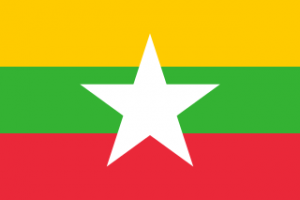This lesson can still be improved. EDIT IT NOW! & become VIP
Burmese Grammar - How to Use "Be"
Hi Burmese learners! 😊
In this lesson, we will explore the use of the verb "be" in Burmese. We will learn how to use it in different tenses and forms, and we will provide you with cultural information and interesting facts. By the end of this lesson, you will have the basic tools to use "be" in Burmese correctly. Let's get started!
The verb "be" is a fundamental verb in any language. In Burmese, it is represented by the word "ဖြစ်" (pronounced "pyei"), which has several uses and meanings. To communicate effectively in Burmese, it is essential to understand the different tenses and forms of "be" and how to use them in different contexts.
Take some time to dive into these other pages after completing this lesson: Pronouns & Nouns and Pronouns.
In Burmese, the present tense of "be" is used to express the existence or presence of someone or something. In its affirmative form, it is translated as "is/am/are" in English. Here are some examples:
| Burmese |
Pronunciation |
English
|
| အလွန်နေးသည်။ |
alwan nè: tha. |
He is a student.
|
| ကျွန်တော်သည်။ |
kywan taw tha. |
They are teachers.
|
| ကိုယ့်ရဲ့ အရာသစ်တောင်းတော်တွင် ဖြစ်ပါသည်။ |
kui: re. ara.saitau.nau.taw.kwin pyei.par.tha. |
Your story is interesting.
In the negative form, "be" changes to "မဟုတ်" (pronounced "ma-hote"), which is translated as "is/am/are not" in English. Here are some examples:
| Burmese |
Pronunciation |
English
|
| အိမ်ငြိမ်း မဟုတ်ဘူး။ |
ain-grihm mahoat bhu: |
It's not cold.
|
| ကျေးဇူးမှု မဟုတ်ပါနဲ့။ |
kyè:zùma.hmu: mahoat par nae. |
It is not a good mood.
|
| ယခုလက်ရေးတခု မဟုတ်တော့ချိုသောပုလဲ မှား ကစားပါတယ်။ |
yèh-kuh-lè: hma: dè:hchue. thaik-pu.le ma:hka. kahka:patae. |
This law isn't fair to all when it comes to playing games.
The past tense of "be" is used to describe things that were true or existed in the past. In its affirmative form, it is translated as "was/were" in English. Here are some examples:
| Burmese |
Pronunciation |
English
|
| ခင်မောင်က လွတ်ကြ သွားပါလား။ |
hkyinmaung ka. lwattchya. swà:balà |
Were you happy when you went there?
|
| စိုးထဲမှာ ရှိတယ်။ |
su:htè:hmar. hre.thae. |
They were there.
|
| ကျွန်တော့ ဘာဖြစ်လို့ မသိလို့လဲ။ |
kywan.dau. bha:pyei.lo:ma. ma.thae.lo:ma |
Were you not here?
In the negative form, "be" changes to "မမှတ်" (pronounced "mamaht"), which is translated as "was/were not" in English. Here are some examples:
| Burmese |
Pronunciation |
English
|
| ကျွန်သည်မလိုပါ။ |
kywan. tha.mei:pa: |
He wasn't tired.
|
| အနည်းဆောင်မမှတ်တော့တဲ့အတုတ်လေးပါပဲ။ |
a.nhì:sàung.mamahtau.ta. dè. a.thoat.le. pa:pa. |
This product wasn't marketed very well.
|
| အခြားငြိမ်းမှာ မမှတ်လို့ ပဲနားနားပါတယ်။ |
ahkyah-ngrihm hmar. mamaht.lo:ma. pa.nanapa.ta |
They weren't eating spicy food elsewhere.
The future tense of "be" is used to describe something that will happen in the future. In its affirmative form, it is translated as "will be" in English. Here are some examples:
| Burmese |
Pronunciation |
English
|
| မှတ်ချက်မှာ စိတ်ချမ်းပြီး ဖြူရင် အိုချိန်မှာလား။ |
htakchik hmar. su:t.chí:pé. pheirén mạ. aiokchue.hnaung.là:ga: |
Will it be safe when we get out with a flashlight?
|
| သူတို့ကြီး ကိုယ့်ရဲ့ ငယ်ငြာ လေးကျင် မျှောပြပါနဲ့။ |
thù.tau.ra. kui: re. nga.ngri: lé:kyin. chau. hpyau:hpya.par.nae. |
Your story will be laughed at by them.
|
| ခုနေရာ ရှိနားတယ်၊ ဒီအတုတ်တော့ ဖြစ်ပွားသွားပါတယ်။ |
khu-nè.ra. hnà. naube.ta. pyei.pwa: swà.balà. |
It will be available here, come and see this one.
In the negative form, "be" changes to "မဘူး" (pronounced "mabhù"), which is translated as "will not be" in English. Here are some examples:
| Burmese |
Pronunciation |
English
|
| ဖိုင်ရင်းပါပဲ။ ဒါကြေငြာနားမှာလားမရောက်ဘူး။ |
peingran:pa:pa. dha.chau-ngri.mya.là.ga:ma.yauk bù. |
It won't be occupied, right?
|
| ဒီဘယ်တော့ ရင်ဘတ်မှာလဲမရောက်မချင်း။ |
dhi.bhe ta. ran. beth.hhmar. ma.yauk maraukh.ma.ching. |
Will it not be included in this package?
|
| လူတိုင်းတဲ့ အခြေခံမှု ထပ်ဖောက်ချိန် မဘူး။ |
lu.dau.tin:ta. ahkhyakhẹh ù. hpaukhauchue.hnaung maphù. |
The teamwork won't be congruent, will it?
The imperative form of "be" is used to give commands or express wishes. In its affirmative form, it is translated as "be" in English. Here are some examples:
| Burmese |
Pronunciation |
English
|
| နှစ်ဆယ် မျှောပြပါ။ |
nzathsa:hmar. hpyau:hpya.pa. |
Be careful for 7 times.
|
| သိမ်းဆုံးရပြီ။ |
thímhsom. yarpì. |
Be the best.
|
| ဥပမာ ပြောနော်။ ထားမလို့ရသေးပါနဲ့။ |
upma. prawnau. htarmaliomahyarai.hlupya.nae. |
Be creative, don't go with it.
In the negative form, the imperative of "be" changes to "လျှောက်ပါ" (pronounced "lyaukpa"), which is translated as "don't be" in English. Here are some examples:
| Burmese |
Pronunciation |
English
|
| နေချိန်မှာလားလျှောက်ပါ။ |
nèhchue.hnaung.là:ga: lyaukpa. |
Don't be late.
|
| အခွင့်အရာကို မလိုပါ။ လူမှာ လျှောက်မှာလားလျှောက်ပါ။ |
ahkhwèn:ahra.cui. ma.liyaukpa. lu.mar.lyaukpa. |
Don't be a problem. Don't be a frustration to others.
|
| အကြီးကြပ်ကြပါ။ ပြုနော်လျှောက်မှာလားလျှောက်ပါ။ |
ahkríkjìkher. pronaunar. lyaukpa. |
Don't be stubborn, you can't get help.
Here is a dialogue between two friends, Htet and Win, to see how the verb "be" is used in context:
Learn Burmese Grammar: How to say 'Before (verb)' - YouTube[edit | edit source]
|
|
|
|
|
|
|
|

